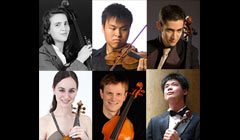Want to see the classical music stars of tomorrow, today? One of the most prestigious competitions for young people in the world is right here in our backyard. For a quarter of a century the Irving M. Klein International String Competition has nurtured talent, launched careers and inspired young players around the world, and they’re kicking off their 25th Anniversary competition with a gala celebration concert. Past finalists will join superstars like pianist Jon Nakamatsu, cellist Gary Hoffman, the Cypress String Quartet and the Alexander String Quartet at 8pm, Thursday, June 10, 2010 in San Francisco State’s Knuth Hall, the competition’s home.
Mitchell Sardou Klein, the Music Director of the Peninsula Symphony and one of the Competition’s founders, says that the idea for a “kinder, gentler” competition began as a tribute to his late father, a renowned cellist and music teacher. By the mid-1980s music competitions had been getting — somewhat deservedly — a bad reputation as hothouses of pressure, rewarding robotic perfection over artistry, and stifling creative development by throwing young performers to the critical wolves and then leaving them hanging. Films like The Competition and, especially, Shine give a pretty good idea of the atmosphere. Klein says that he and his partners felt it was important to make sure the setting would be friendly and supportive; “Music,” he says, “is not a competition, it’s a shared artistic experience.” Competitors are hosted by local families, they get coaching, play chamber music together, and they get to play their jury pieces all the way through — nobody has to worry about the dreaded “thank you” interrupting them. They learn to craft performances, not just play auditions.
Ironically, the Klein Competition is much better known internationally than it is right here in its hometown, at least outside the academic community. Mitchell Klein figures it’s their “modest investment in publicity,” but clearly that hasn’t hurt the competetion’s standing in the rest of the music world. Of course, looking at the careers of past competitors doesn’t hurt. World-renowned soloists like Vadim Gluzman, Joshua Roman, and Lara St. John, and respected chamber and orchestral musicians like Wendy Warner, Hai-ye Ni, and Alexis Gerlach have all been semi-finalists in the Klein; Roman even enjoyed the experience so much he came back after a third-place finish in 2003 to finish second in 2004.
This year’s competitors come from New Jersey, Pennsylvania, Illinois, England, South Korea and China and span the full age range of eligible competitors, 15 to 23. There are cash prizes — it wouldn’t be a competition without them — but the winner also gets solo appearances with the Peninsula and Santa Cruz Symphonies, recitals with Chamber Music Tulsa and Music in the Vineyards, and a San Francisco Bay Area benefit concert. The California Music Center, the competition’s parent organization, follows all the finalists, providing guidance through the early stages of their careers.
As the director of a competition that prides itself on its “family” atmosphere, it’s probably not surprising that some of Mitchell Klein’s favorite memories have nothing to do with the music being made. One violinist, whom Klein declined to identify except to say that she is now a world-renowned soloist, came to the competition with a reputation of being temperamental, and did nothing to alter that impression in the competition’s early stages. She was so unhappy with her semi-final performance that she didn’t even show up for the announcement of the finalists; of course, she was one. Klein says that later that night — about 2am — he got a call from a very noisy country/western bar, in which he could barely make out a squeaky and somewhat slurred voice shouting “You have got to be BLEEPING kidding me!” Needless to say, said soloist was not at her best for the finals the next day, but she still keeps in touch and, Klein says, has turned into a “lovely young woman.”


